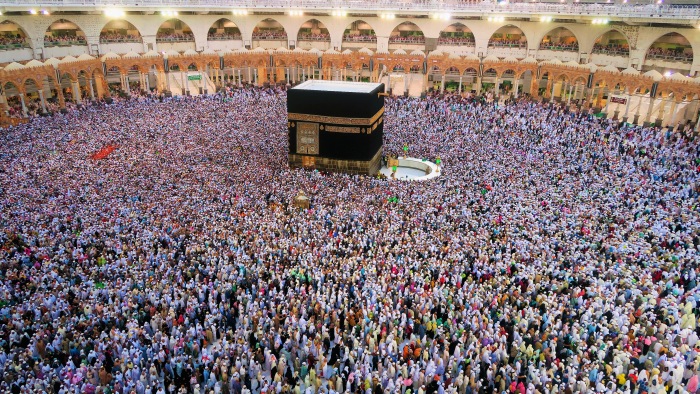Survey Shows Concern about Radical Islam
Clear majority dissatisfied with established parties' fight against Islamism

kaaba-pexels-konevi.jpg
The Kaaba in Mecca (Photo: Konevi/Pexels)
A majority (66 percent) of the population blames "right-wing extremists" for rising anti-Semitic violence - but at the same time 53 percent also consider "radical Islamists" to be the cause. This is the result of a joint study by the WZB Social Science Research Centre Berlin, the Alice Schwarzer Stiftung and the Giordano Bruno Stiftung. For this study, the Institut für Demoskopie Allensbach (Allensbach Institute) asked a representative sample of nearly 1,000 people about their attitudes towards Islam and Islamism.
The survey shows that the majority of people in Germany have a nuanced view of Islam and distinguish very precisely between "Islam" and "Islamism". For instance, 65 percent believe that "Muslims must have the same right to freedom of religion" as Christians. At the same time, only 5 percent of those surveyed believe that Islam poses no threat to German society. A majority of 63 percent, however, do not see "Islam" as threatening, but certain Islamist groups, which they fear could change the social climate and contribute to a regression in tolerance and gender equality.
71 percent of the respondents expect that a "radical interpretation of the Koran" incites violence and that "hatred and intolerance are spread in some mosques". Accordingly, 61 percent demand that Islamic organizations financed from abroad should be banned. The current Allensbach survey also shows that unease about the Islamic full-face veil remains very high: 90 percent are in favour of a "burqa ban", either in general or in certain areas. Regarding the headscarf, 61 percent advocate a ban for female teachers in public schools and 53 percent for a ban for girls under the age of 14. At the same time, a majority affirm the right to wear a headscarf in private businesses such as supermarkets.
The gap between the majority's concern about radical Islam and their confidence in the political parties' ability to solve the problem is striking. To the question "Which party or parties in Germany are particularly committed to the fight against radical Islam?", 4 percent answered: the Left / 5 percent: the Greens / 7 percent: the FDP / 9 percent: the SPD / 21 percent: the CDU/CSU – and 43 percent: the AfD. According to Allensbach head Prof. Renate Köcher: "The overwhelming majority not identifying any of the moderate parties as advocates on an important issue is a risky constellation.” The question of the established parties' relationship to political Islam could consequently still play an explosive role in the upcoming elections.
The survey "Einstellungen zu Islam und Islamismus" ("Attitudes towards Islam and Islamism") is one of the first and most comprehensive studies on this range of issues. It will be published in full on the internet on 11 June 2021. Ruud Koopmans, department director at the WZB Social Science Research Center Berlin and professor of sociology and migration research at Humboldt University, will present the survey on 9 June 2021 in DIE ZEIT (issue 24/2021). The study is also the focus of the upcoming EMMA issue, which will be published on 24 June.
Related links:
- Mehrheit fühlt sich von radikalem Islam bedroht (Welt, 8.6.2021)
- Islam in Deutschland: Für ein friedliches Zusammensein. Guest article by Ruud Koopmans on the results of the study (ZEIT, 9.6.2021)
- Ergebnisse der Umfrage "Einstellungen zu Islam und Islamismus". Analysis by the IfD Allensbach (Alice Schwarzer Stiftung, 11.6.2021)
